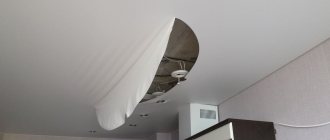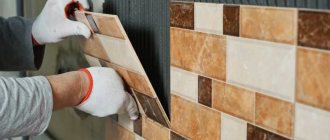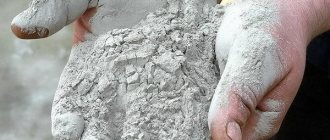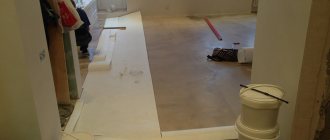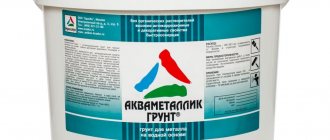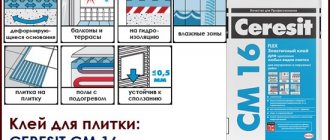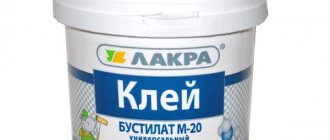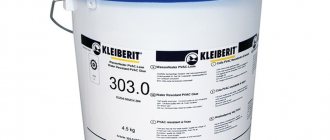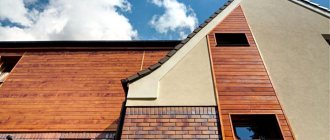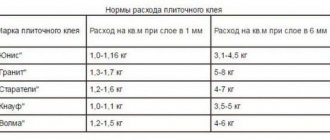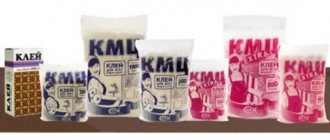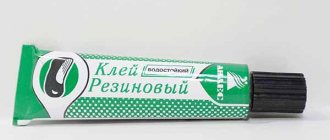Today it is not easy to select all the necessary materials for repairs. One of the particularly difficult moments is finding the most suitable adhesive for porcelain tiles. It can be found in a variety of variations, the choice makes your eyes run wild all the time, but you need to remember - it must meet all the necessary standards and criteria if you need an adhesive that will hold the tiles for a long time.
Adhesive for porcelain tiles
Everyone knows that glue and its choice directly affect the quality of the cladding. Bad glue will not hold a heavy slab, so you need to look at the effectiveness of the glue in different conditions.
Inexpensive, but reliable and effective - this is what the ideal adhesive for porcelain tiles should be. Which one is better – we will talk about this in this article.
Porcelain tile floor in the kitchen
In general, about adhesive for porcelain tiles
Installation of porcelain tiles is a rather scrupulous procedure, primarily due to the characteristics of the material. Low moisture absorption forces us to look for elastic adhesives, since ordinary cement adhesives will not work here.
It is important to select adhesive for porcelain tiles taking into account many criteria
The solution is the type of glue discussed in the article due to its ability to hold the material and not let water in. The choice of such adhesive depends on two parameters - where it is used and what features the tile has. We will consider them below.
Where to use glue
If you want to install porcelain tiles outdoors, then, logically, you need to look for an adhesive for outdoor use. Any other one won't do.
The street is a rather aggressive “environment” with its constant temperature fluctuations, various types of precipitation, exposure to UV rays and wind. Don’t forget about mechanical damage as a result of various types of events. Therefore, it is necessary to use not only a durable material in the form of porcelain stoneware, but also an adhesive that can firmly adhere the material to the surface and also withstand various aggressive influences.
Outdoor cladding requires the use of extremely durable adhesives
Don’t forget about such an interesting point as the location of the cladding on the street. Porch, plinth, concrete surface - each place needs its own approach, which means “its own” glue. For the porch, as a rule, water-repellent options are used, for the base - water-repellent with increased fixation. Any adhesive for exterior use is suitable for concrete surfaces.
Loggia, balcony, veranda - there will be a different approach here. Since they are located outside, but still attached to the apartment or house, the temperature there will be lower. For these places you need to take adhesives that are highly resistant to moisture and frost.
Resistance to various aggressive influences – that’s what a good glue should have
Finishing the inside is much easier - there are not a lot of all kinds of difficulties. But this does not cancel the rule of selecting glue depending on the location. In the bathroom, for example, you need moisture-resistant elastic adhesive. In addition, you need to seal the seams there with grout (waterproof, of course). It is also worth using fungicidal glue for the bathroom - it will prevent the formation of fungus and mold. For the floor - glue with a plasticizer, which makes it more elastic. For walls - adhesive with a high level of fixation, which will withstand the high tensile loads caused by porcelain tiles.
Internal cladding is a simpler matter, but you still have to select the appropriate adhesive for each room
About the features of the tiles
Anyone who has experience in repairs knows the golden rule of fixing any tile - the thickness of the mortar = the thickness of the tile. This is the only way to achieve correct fixation.
Porcelain tiles and their markings: what do the pictures and numbers on packaging and catalogs mean?
However, thickness is not the main parameter of the tile. What is more important is the length and width, since as the size of the tile increases, its weight increases. And the heavier the tile, the greater the level of fixation the glue should have.
Let's take two tiles as an example. The first size will be, for example, 100x100, and the second, say, 300x300. The second tile is three times larger than the first, but they can both be fixed with universal glue. Large tiles are another matter. To hold it you need a more serious, reinforced glue.
The characteristics of the tile itself, and especially the dimensions, must be taken into account
Rating of adhesive compositions for porcelain tiles
| Photo | Name | Rating | Price | |
| #1 | Bergauf Granite | ⭐ 4.95 / 5 1 - voice | Find out the price | |
| #2 | Litokol HyperFlex K100 | ⭐ 4.9 / 5 1 - voice | Find out the price | |
| #3 | Plitonit B | ⭐ 4.85 / 5 | Find out the price | |
| #4 | Eunice Granite | ⭐ 4.8 / 5 3 - votes | Find out the price | |
| #5 | Mapei Kerabond T | ⭐ 4.75 / 5 | Find out the price | |
| #6 | Litokol Litoflex k80 | ⭐ 4.7 / 5 | Find out the price | |
| #7 | Bergauf Keramik Pro | ⭐ 4.65 / 5 1 - voice | Find out the price | |
| #8 | Knauf Fliesen | ⭐ 4.6 / 5 1 - voice | Find out the price | |
| #9 | Ceresit CM 14 Extra | ⭐ 4.55 / 5 5 — votes | Find out the price | |
| #10 | KM 25 reinforced | ⭐ 4.5 / 5 1 - voice | Find out the price |
What adhesive for porcelain tiles would you choose or recommend?
Take the survey
Installation of porcelain tiles involves the use of a special highly elastic adhesive. Conventional cement mixtures, which are used when installing ceramic tiles, are not suitable, since they are not designed to hold such a heavy material as porcelain stoneware in one position. Our list includes 10 popular and reliable compositions that will definitely make the porcelain stoneware surface reliable and durable. Please note that our rating is not a direct guide to purchasing these particular types - you can buy any other option. The list is compiled based on data on the popularity of the compositions, as well as reviews about them on the Internet.
No. 1 – Bergauf Granit
Bergauf Granit
This adhesive is considered one of the best among all other compounds used for large-sized porcelain tiles. It is very popular because it has a relatively low price, but at the same time has excellent characteristics. It is based on cement, the composition is suitable for decorating floors and walls, even in wet rooms, and is suitable for installation outdoors and for cladding the walls of a swimming pool. It is not afraid of either humidity or changes in temperature conditions: the composition does not lose its properties in a wide temperature range from -50 to +70 degrees. Withstands very heavy loads, has low consumption, and its drying speed is 24 hours.
pros
- frost-resistant
- suitable for outdoor work
- suitable for work in damp areas
- economical consumption
- high adhesion
Minuses
- not detected
Prices for adhesive for Bergauf Granit porcelain tiles
Bergauf Granit glue
No. 2 - Litokol HyperFlex K100
Litokol HyperFlex K100
This is a universal composition, excellent for gluing heavy natural stone and porcelain tiles. Belongs to the group of cement compounds, is very elastic and provides a very strong connection. In addition, it has a white color, due to which it can be used for almost any work. The composition contains synthetic resins that increase its technical characteristics. The material is easy to apply, does not thicken for a long time, but at the same time allows you to work comfortably even on a vertical surface, and the tiles do not slip during installation. The composition is not afraid of frost and is also resistant to water. It is so good that it is recommended for use even in high-traffic areas - for example, in airports, supermarkets, etc.
pros
- does not contain asbestos - safe
- the tiles do not slip during laying
- high adhesion
- increased elasticity
- wide range of applications
Minuses
- Expensive
Prices for adhesive for porcelain tiles Litokol HyperFlex K100
Litokol HyperFlex K100
No. 3 – Plitonit B
Plitonit B
This glue is one of the most popular and relatively inexpensive options; it can be bought in almost every hardware store. The composition contains reinforcing fibers that provide high strength of connection between the finishing material and the base. The glue is easy to mix and prepare for application. The temperature range of use is very wide (-50 - +70 degrees) and allows the composition to be used both for indoor and outdoor finishing. The composition is universal - it can be used not only for porcelain stoneware, but also for ordinary tiles, even very large ones. The glue is safe for human health and does not have a negative effect even on the bare skin of the hands. However, there is also a drawback - for 3 days after laying the tiles using this composition, the temperature in the room must be maintained within the range of +5 - +30 degrees.
pros
- wide temperature range
- versatility
- high popularity
- reinforcing fibers in the composition
- ease of preparation and use
Minuses
- difficulties in drying the composition
Prices for adhesive for porcelain tiles Plitonit B
Plitonit B
No. 4 – Yunis Granite
Eunice Granite
Glue, perfect for working outdoors, even at temperatures of -5 degrees. It contains a cement base with mineral additions, as well as a number of chemical compounds that improve the characteristics of the glue. The glue is easy to apply, with a fairly thin layer of up to 1.5 cm, but at the same time it holds even large tiles and porcelain stoneware perfectly. The drying speed is very fast - after 3 hours the composition will be completely dry, and it will not be afraid of either contact with water or exposure to temperatures. The consumption is quite economical, and the glue can be applied to different types of substrates.
pros
- economical
- dries quickly
- Can work at sub-zero temperatures
- thin layer when applied
- moisture resistant
Minuses
- not sold everywhere
Prices for adhesive for porcelain tiles Yunis Granit
Eunice Granite
Reviews of Eunice Granite glue
No. 5 – Mapei Kerabond T
Mapei Kerabond T
A composition that is optimally suited for the installation of porcelain stoneware and heavy tiles. It behaves ideally when working both vertically and horizontally - the finishing material does not slip or fall off if the installation technology is followed. The composition is based on cement and comes in both gray and white (white, of course, costs more). The adhesive is resistant to moisture, easy to use, as it does not harden very quickly after mixing, and adjustments to already laid tiles are allowed within 45 minutes. The composition can be used to install elements at a temperature of +5 - +40 degrees.
pros
- optimal for heavy finishing materials
- behaves well when performing work in the vertical and horizontal plane
- resistant to significant levels of humidity
- two kinds of color
- easy to use
Minuses
- Expensive
- not suitable for use on deformable substrates
Prices for adhesive for porcelain tiles Mapei Kerabond T
Mapei Kerabond T
No. 6 – Litokol Litoflex k80
Litokol Litoflex k80
Cement adhesive, which can be called universal, since it is used to work not only with porcelain stoneware material, but also with ordinary tiles and natural stone. The composition is optimal for finishing showers and bathrooms, as well as balconies, for cladding terraces and facade elements. The composition is very elastic, with a high adhesion rate, according to tilers it is very convenient and easy to work with, it is not afraid of either temperature or moisture, the glue is frost-resistant. Due to the absence of asbestos fibers, it is safe for humans and is considered an environmentally friendly composition. If you believe the reviews, the glue adheres excellently.
pros
- thin layer application
- frost resistance
- suitable for outdoor use
- suitable for finishing showers
- high adhesion
Minuses
- Expensive
Prices for adhesive for porcelain tiles Litokol Litoflex k80
Litokol Litoflex k80
Reviews of Litokol Litoflex k80 glue
No. 7 – Bergauf Keramik Pro
Bergauf Keramik Pro
An effective adhesive composition with very high joint elasticity, which is suitable for installing various tile finishing materials. Provides a reliable connection between the base and finishing material, both porcelain stoneware and natural stone, ordinary tiles. It does not lose its properties at very low (-50) and very high (+70) temperatures, therefore it is optimal for working with heated floors or outdoors. It is not afraid of exposure to moisture, so it is suitable for rooms where there is a high level of humidity. The disadvantages include the difficulty of working with thick layers, as well as the rapid hardening speed of the composition - the life of the finished solution is only 20 minutes.
pros
- not afraid of thermal changes
- moisture resistant
- suitable for underfloor heating systems
- versatility of use
- high seam elasticity
Minuses
- short life of the compound involved
- Difficulty working with thick layers
Prices for adhesive for Bergauf Keramik Pro porcelain tiles
Bergauf Keramik Pro
No. 8 – Knauf Fliesen
Knauf Flizen
Another cement-based adhesive from a well-known manufacturer, which is recommended for installing porcelain tiles. It provides an excellent connection of finishing material on various types of bases, but only dense solid ones. Frost resistance allows it to be used for exterior decoration. Elements that can be glued with it should not exceed 30x30 cm on the walls and 60x60 on the floor. Purchasing the required amount of the composition will not put a big dent in your pocket, since the glue is quite inexpensive, but at the same time very high quality, and is convenient and economical to apply.
pros
- low price
- economical
- popular composition
- convenient and easy to apply, as it does not set instantly
- frost-resistant
Minuses
- not suitable for heated floors
- for small elements
Prices for adhesive for Knauf Flizen porcelain tiles
tile adhesive Knauf Flizen
No. 9 – Ceresit CM 14 Extra
Ceresit CM 14 Extra
One of the cheapest compounds, which is recommended for installation of porcelain stoneware elements measuring 50x50 cm. It is quite suitable for finishing both vertical and horizontal bases, both indoors and outdoors. When using the composition strictly according to the instructions, the glue ensures a high quality connection. It is easy to use, does not allow finishing materials to slip during work and is not hazardous to human health. Can be used effectively on concrete and cement bases. Tiler masters note that the glue has excellent viscosity and is easy to use.
pros
- ease of use
- environmentally friendly
- reliable connection
- frost-resistant
Minuses
- only for non-deformable surfaces
- for small finishing elements
Prices for adhesive for porcelain tiles Ceresit CM 14 Extra
Ceresit CM 14 Extra
No. 10 - KM 25 reinforced
KM 25 reinforced
This is the cheapest adhesive option on our list, which is suitable for installing heavy types of tiles and porcelain stoneware. Recommended for finishing floors both inside and outside, especially those where high loads on the base are possible. Provides excellent adhesion of the finish to the rough base due to the presence of a large number of plasticizers in the composition. Suitable for installation of products measuring 40x40 cm, compatible with underfloor heating systems, mixes well and easily and hardens within 24 hours. Reliable glue at the best price.
pros
- low price
- withstands heavy loads
- compatible with heated floors
- suitable for exterior finishing
- convenient and easy to use
Minuses
- for small elements
- optimal for floor finishing only
Prices for adhesive for porcelain tiles KM 25 reinforced
KM 25 reinforced
Video - Comparison of adhesives for porcelain stoneware and tiles
About the requirements for adhesive for porcelain tiles
Ceramic granite is a relatively recent “invention”. As soon as it appeared, it immediately became popular on the construction market, and therefore it is taken quite often. In terms of its properties, it can be compared with natural stone and ceramic tiles, and porcelain stoneware surpasses the latter in many respects.
Porcelain tiles are unique. A large number of colors, durability, high resistance to various influences, does not allow moisture to pass through - all this can be said about this building material.
Porcelain tiles are a truly interesting material for use in cladding.
Today, porcelain tiles are quite relevant. It is especially often used where a serious operational load is expected - pavilions, subways, all kinds of stations and airports, as well as warehouses.
Important! It is better to take only specialized mixtures. Then the porcelain stoneware will be fixed correctly.
Adhesives for porcelain tiles
Let's move on to the requirements that the adhesive purchased for laying porcelain tiles must meet.
- Material water absorption level. It, as is already clear from the previously mentioned information, should be minimal. This is explained by the density of the structure of porcelain stoneware - a material that is unable to absorb either water or glue. In this case, you have to rely on special substances that increase the adhesion of the material to a level where it can absorb glue.
The structure of porcelain stoneware is dense
- Material hardness. Porcelain tile is a material that does not bend. At the same time, it is quite fragile in relation to the effects of temperature, as well as load. Porcelain tile adhesive must be resistant to cold or heat, as well as elastic to withstand the load that appears between the base of the porcelain tile and the outer covering of the wall or floor.
Important! Elasticity plays a doubly important role when it comes to a “warm floor” system.
- Stability of porcelain stoneware. With a material like this, you need to think about what kind of weather it will withstand and in what location. As a rule, when choosing an adhesive for exterior use, the number of cycles is inspected. A good adhesive for porcelain tiles with a high level of frost resistance will have a value of about 50 or even more.
Do you want a good adhesive for porcelain tiles? There's a lot to consider then.
Features of porcelain stoneware
Porcelain stoneware is a special tile covering. It is resistant to chemical and atmospheric influences. Intended for indoor use and external cladding of buildings. The material has high mechanical strength and water protection properties. To fully demonstrate these properties, you need to properly glue porcelain tiles. In appearance, porcelain tiles are similar to ceramic ones. But there are differences. Porcelain tiles have the following qualities:
- super strength;
- wear resistance;
- resistance to chemical influences;
- hydrophobicity;
- frost resistance;
- heat resistance.
The dense internal structure allows it to withstand loads and resist mechanical damage. The material does not wear out, scratches do not appear on it, and does not fade on the street. Can be used for finishing floors and walls in chemical laboratories, on open terraces, in swimming pools, in bathhouses, and on the streets. But the main quality of this material is its heavy weight. This factor is both positive and negative. This is due to the choice of special glue.
Classification of tile adhesives by composition
Depending on the type of components, tile adhesive is usually divided into the following groups:
- cement-based adhesives;
- epoxy adhesives;
- dispersion compositions;
- polyurethane adhesives.
Let's look at them all in the table below.
Table No. 1. Types of glue.
| Type of glue | Description |
| Cement glue | Such adhesives are affordable - which is why cement is still popular as an adhesive material. In addition to it, the composition can contain polymer additives (the elasticity of the glue also depends on them) and sand. All three components ultimately provide the properties that cement adhesive is known for - resistance to water, elasticity and a high level of adhesion. Preparing the glue couldn’t be simpler – just pour it in, mix it and add water. However, there is a drawback to such ease - after pouring water, the glue begins to act and in the short time that remains, you need to have time to apply the material to the porcelain stoneware or wall and install it. |
| Epoxy adhesive | Recommended for use with facing materials that have a smooth base. It is considered a two-component composition - in addition to epoxy resin, the adhesive contains a catalyst. Preparation for use is considered quite simple, you just need to follow all the instructions on the instructions. Stable, strong, does not shrink. Expensive and difficult to install in cold weather. |
| Dispersion glue | Being solvent-free, the paste-like reinforced dispersion adhesive allows you to forget about the issue of the strength of the installed porcelain tiles due to the high tenacity of the mixture. Unlike the two adhesives listed above, this one is already ready for use, which means it does not need to be prepared. This glue is considered the most optimal option for use outside the house or inside apartments, because its high tenacity and strength allow it to withstand heavy materials. And you need to spend less of it. There is only one minus - high cost. |
| Polyurethane glue | The most diverse adhesive in terms of the number of components. It can consist of either one or two components. High resistance to heat, water and chemicals helps protect the material from destruction. Can be used both for heated floors and for installing material in places that frequently vibrate. |
Each of the four types of glue has its own pros and cons.
Components of glue
As in the case of cement mortar, the adhesive is based on Portland cement, which is enriched with a large number of improving additives. There is fine quartz sand as a fractional filler. Modifiers are introduced into the composition depending on the recipe of a particular manufacturer; they can amount to up to 5% of the total mass.
The following substances are most often used as additives:
- methylcellulose ether is a component that is capable of retaining moisture, its rate determines the rate of hardening of the adhesive mixture;
- starch ether – determines the deformation rate of the glue;
- polymers, resins - the strength of adhesion to the base, plasticity, and lack of tendency to crack depend on them;
- various plant and synthetic fibers - reduce the force of tile sliding, increase the strength of the masonry.
Is it possible to level the walls, floor and ceiling with tile adhesive?
Initially, the adhesive for laying tiles was not planned to be used to level the surface, which means that this method of application is the result of folk ingenuity. We will mention several cases where glue can be used during alignment.
- Cracking of the screed due to incorrect technology for laying the material, as well as poor-quality composition of the adhesive previously used for laying the tiles.
- When the distance to the door opening is too short to use self-leveling mixtures.
- Partial peeling in several places throughout the room.
- Shedding of the top layer after pouring.
Not always, but in general, you can level surfaces with tile adhesive
However, leveling with glue has limitations, according to which this method may not always be successful. And this method is not capable of solving serious problems. In this case, it is better to use bulk mixtures - they are more reliable and durable.
Tips for choosing porcelain tiles
Features of calculating the adhesive layer for porcelain tiles
The golden rule of a tiler says: reliable fixation is ensured by the following formula - the thickness of the mortar layer should be close to the thickness of the tile. However, for porcelain stoneware material, the width and length of the tile should also be taken into account, because due to these parameters its weight increases. So, for smaller samples it is quite possible to use even universal adhesives - they will be able to support the tiled element both on the wall and on the floor. But if the porcelain tiles are large in size, for example, 300x300 millimeters, then in this case the use of special glue will be 100% necessary. From these sizes onwards, only a special reinforced adhesive should be used.
Tips for laying tiles
- You can glue tiles to the floor from anywhere. It is still better to lay whole tiles rather than cut ones.
- You need to make lines to show where the tiles intersect.
- The surface is primed before applying the glue.
- The tiles are glued at the intersection of the tiles. Just start from there, no other places.
- Mix enough glue for one square meter. If you do more, it will be more inconvenient for yourself, because you will have to re-apply the glue due to its rapid drying.
- After installation, you need to level it so that the seams and surface are even.
- Carefully trim the tiles to remove excess.
Even without much experience, you can glue the tiles to the floor yourself, following the advice of the experts.
Congratulations, you have glued the tiles to the floor yourself.
Tips and tricks
In order not to make a mistake in choosing an adhesive and to use it correctly in your work, you need to take into account the important recommendations of professionals:
It is always important to pay attention to the product label because this is where it will tell you what surface the mixture is suitable for and what type of adhesion it has.
To lay porcelain tiles on substrates such as plastic or wood, it is better to use glue that contains polyurethane.
You should never level walls using adhesive solutions.
- The bonding agent is applied to the surface with a trowel and then leveled.
- While the adhesive used to lay porcelain tiles on the floor is drying, you should not walk on this surface for three days.
- When finishing walls, work should start from the bottom.
- The stage of attaching the tiles to the base must be completed by grouting the joints. This is done to create a more aesthetically pleasing coating.
Adhesive for porcelain tiles must meet the requirements of construction standards.
The thickness of the adhesive mixture should be equal to the thickness of the tile.
The key point is the preparatory stage, which consists of stripping and leveling the base.
When installing small tiles, it is important that the composition is well subject to deformation.
All the features that are inherent in porcelain stoneware will be preserved only if it is installed correctly using the right glue. When adhering the tiles to the adhesive mortar, you need to take into account the level of comfort when working with such compounds. The polymer elements included in the formulation allow installation not only for professionals, but also for beginners.
To learn how to choose the right adhesive for tiles, watch the following video.
Consistency of tile adhesive - what should it be?
Each manufacturer of the adhesive composition decides for himself what the proportion for diluting the dry adhesive mixture and water will be. As a rule, the ratio is 20 to 5.
Preparation of tile adhesive
However, other ratio options that can be found on the packaging are not excluded. The changes are due to a different composition of the glue, for example, the presence of PVA or other components, which means you need to add more or less glue or water.
Requirements for mixtures
Tile adhesive for porcelain tiles should have different properties under different conditions. To lay tiles on a warm floor you need an elastic adhesive. When tiling, the heated floor heating must be turned off and turned on only after the glue has completely dried. The packaging with the adhesive mixture must have a corresponding inscription.
When cladding the external walls of buildings, when paving sidewalks and paths, you should choose adhesive with the letter “F” on the package. The number next to it indicates the number of freezing and subsequent thawing that the glue can withstand.
Before using any adhesive, preparation of the substrate is especially important. It needs to be cleaned of old plaster, dust, grease stains, and old paint. Then the surface is leveled and primed. All these operations will be the key to the durability of the porcelain stoneware coating.
About glue consumption
There is a question that interests everyone who carries out facing work - how much glue should be used. For most manufacturers, the answer to this question can be found directly on the packaging. Another place to look for an answer is the instructions for use.
Important! The indicated numbers can be and even most likely will be very relative - in reality, expect different values.
Tile adhesive consumption rates per square meter
A number of conditions determine how much glue will be used.
- Type of glue. There are thick and liquid variations, each of them differs in its consumption indicators. For cement-based tile adhesive, diluted with water, the consumption is from one to two kilograms per square meter, which is quite normal.
- Tile type. Porcelain tiles absorb the least amount of glue, glazed tiles absorb a little more, and the most “gluttonous” are cotto and hand-made tiles.
- Laying surface. Ideally, it should be even and smooth, and then very little glue is needed on such a surface. The more porous the surface, the more adhesive mixture will be needed, since such material will absorb it.
Laying porcelain tiles on the floor
- Weather . Environmental conditions when working with tile adhesive should be quite optimal. The temperature, for example, should be around +18-25 °C. If the temperature is higher, then you need to add more mixture due to moisture evaporation. Temperatures below zero are not even considered at all - at them the glue loses its properties.
- Professionalism of the stacker. The most important point in determining the glue consumption is the master himself. It determines how much glue will be used. His experience, installation technology, spatula used - all these “little things” directly affect the glue consumption.
Many factors influence glue consumption
Important ! A V-shaped spatula is ideal for installation. It will be a little worse with a U-shaped spatula. It will be easiest to find a spatula with square teeth of different shapes.
Table No. 2. Glue consumption.
| Tile side size in cm | Spatula tooth length in mm | Recommended glue consumption in kg/sq.m. |
| 3 | 2 | |
| 5-10 | 4 | 2,5 |
| 10-20 | 6 | 4 |
| 20-30 | 8 | 5 |
| 30-40 | 10 | 6,5 |
| > 40 | 12 | 8 |
There is a nuance - when using this table, you need to take into account possible changes in the direction of increasing the glue layer.
Calculator for calculating the amount of adhesive for laying tiles
Go to calculations
Terms of use
When preparing and using the working mixture, you must adhere to the following rules:
- The solution is prepared in parts, since it must be worked out in a certain time; it is not left for tomorrow.
- When mixing, water is poured in portions.
- Mixing is carried out constantly; it is more convenient to do this with a construction mixer or a drill with an attachment.
- Application is best done with a notched trowel; the size of the teeth depends on the size of the tile material.
- If the tiles are laid on the floor, then it is not recommended to walk for two days.
Tips for choosing tile adhesive based on manufacturer
Today it is quite easy to find good adhesive for laying porcelain tiles. But there are very few truly good products. This happened due to the peculiarities of the work of companies producing tile adhesive around the world.
It is worth purchasing adhesive for porcelain tiles only from trusted manufacturers
Some companies produce products for use within certain cities, others - for a specific country, and others are generally considered to be exported.
In Russia you can find products from such popular brands:
- KNAUF;
- Ceresit;
- Ivsil;
- Bergauf;
- Unis.
KNAUF company logo
Manufacturers rating
The manufacturer's reputation is very important when choosing an adhesive. Most popular brands that have been on the market for a long time produce high-quality adhesives that can be safely purchased for laying porcelain tiles. The following brands have proven themselves well:
- Unis (Yunis);
- Ceresit (Ceresit);
- Litokol (Litokol);
- "Hercules";
- Mapei (Mapei);
- "Osnovit";
- Weber Vetonit (Vetonit);
- "Plitonite";
- "Volma-ceramic";
- "Sartexim" (KP A2 glue);
- "Bergauf" and others.
Popular brands
It is worth taking a closer look at the most famous brands of adhesives for porcelain tiles, which are sold in construction stores.
"Volma Keramik"
Moisture-resistant adhesive for tiles and porcelain stoneware "Volma Keramik-plus" is produced in Russia. It has high adhesion to various substrates, is plastic, and is intended for small and medium-sized porcelain tiles.
"Unis Granite"
This mixture is useful when laying large, heavy slabs, including on the facade of a building. Suitable for installing heated floors. Eco-friendly, can be used in children's rooms.
Unis 2000
It has high adhesive ability, suitable for porcelain tiles and stone. Allows you to decorate with porcelain stoneware all external walls, facade, except the base. Can be used as a basic leveling agent and easily tolerates temperature changes.
Bergauf Keramik
It is considered a reinforced mixture, has high moisture resistance, and is excellent for bathrooms. The product is intended only for simple bases, although it is quite strong and flexible.
Ceresit CM 11
Ceresit CM 11 adhesive has an average adhesion level of 0.8 MPa; it is most often chosen by beginners due to its long drying time and the ability to correct the position of the tiles. Glue is often used for small and medium-sized porcelain stoneware slabs. If you have to work outside the building, it is better to choose glue from the same line - Ceresit CM117, which is intended specifically for outdoor work.
Litoflex K80
The product is considered professional, has high adhesion, and can even reliably glue porcelain tiles over tiles. Often used for installing heated floors. The adhesive is elastic and suitable for use indoors and outdoors.
Knauf Fliesen
Knauf brand adhesives are the leaders in terms of purchase among analogues. They are suitable for tiles of different sizes, including large ones. The thickness of the glue can be small (up to 7 mm), which is enough for reliable adhesion to the base.
Founded Mastplix T 12
The adhesion of the composition is low (0.5 MPa), so it is used only for simple surfaces and small tiles. The solution is viable for 2 hours, dries slowly, allowing you to adjust the position of the porcelain stoneware.
